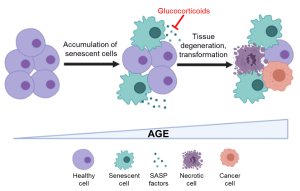Biochemistry
Impact of glucocorticoids on senescence-driven inflammaging. Created with BioRender.
Graphic: Aishwarya Iyer-BierhoffResearch topic
The research focus of our lab is the investigation of the molecular mechanisms of gene regulation, in particular regulation of transcription. Defective regulation of genetic programs is responsible for the development of many diseases, whereby the activation or repression of the respective genes by transcription factors and epigenetic changes play a central role.
Stress induces persistent and functional epigenetic changes, affecting health and lifespan. The hypothalamus-pituitary-adrenal (HPA) axis is the major neuroendocrine circuit that initiates and regulates adaptation to stress. Upon encountering stressors, the HPA axis triggers the release of cortisol, which binds to the glucocorticoid receptor (GR). This activates an anti-inflammatory transcriptional response to mitigate the threat and restore homeostasis. During aging, senescent cells that exhibit a pro-inflammatory secretory phenotype (SASP) accumulate and fuel a chronic, systemic, low-grade inflammatory state termed inflammaging. This state accelerates age-related comorbidities such as frailty, neurodegenerative and cardiovascular diseases. How aging-associated deregulation of the HPA axis and GC-GR signaling impact inflammaging remains unclear. We investigate the molecular mechanisms underlying GR-mediated epigenetic regulation of senescence and inflammaging.
Selected publications
Iyer-Bierhoff A, Wieczorek M, Peter SM, Ward D, Bens M, Vettorazzi S, Guehrs KH, Tuckermann JP, Heinzel T. (2024) Acetylation-induced proteasomal degradation of the activated glucocorticoid receptor limits hormonal signaling.External link iScience, 108943
Ehle C, Iyer-Bierhoff A, Wu Y, Xing S, Kiehntopf M, Mosig AS, Godmann M, Heinzel T. (2024) Downregulation of HNF4A enables transcriptomic reprogramming during the hepatic acute-phase responseExternal link. Commun Biol, 7(1):589
Kühne M, Kretzer C, Lindemann H, Godmann M, Heinze T, Werz O, Heinzel T. (2021) Biocompatible valproic acid-coupled nanoparticles attenuate lipopolysaccharide-induced inflammation.External link Int J Pharm, 601:120567
Kühne M, Lindemann H, Grune C, Schröder D, Cseresnyés Z, Godmann M, Koschella A, Figge MT, Eggeling C, Fischer D, Heinze T, Heinzel T. (2021) Biocompatible sulfated valproic acid-coupled polysaccharide-based nanocarriers with HDAC inhibitory activity.External link J Control Release, 329:717-730
Krämer OH, Knauer SK, Greiner G, Jandt E, Reichardt S, Gührs KH, Stauber RH, Böhmer FD, Heinzel T. (2009) A phosphorylation-acetylation switch regulates STAT1 signalingExternal link. Genes Dev, 23(2):223-235
